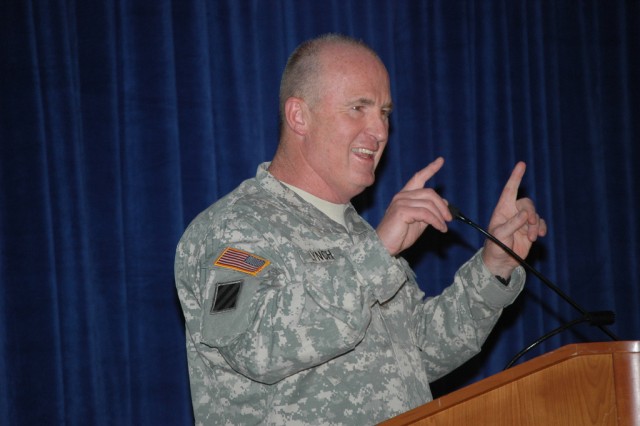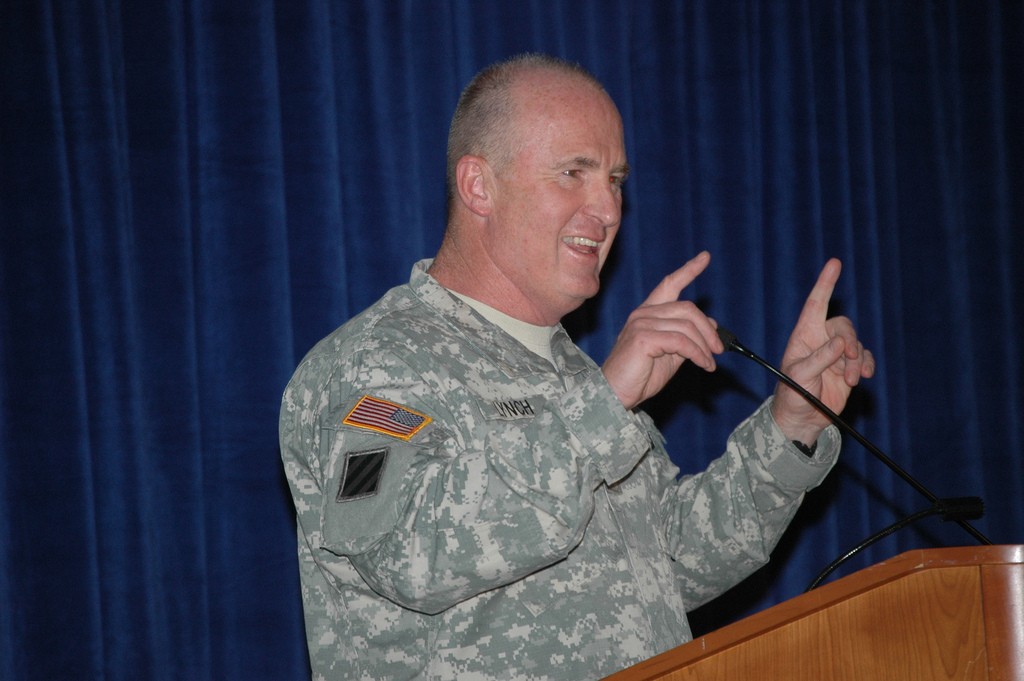We often recognize and honor the commitment and sacrifice of our military Families. The strength of our Army is the Army Family, and we are asking more of Families than at any time in the past. As such, the Army is aggressively working to support those who are the strength of our Soldiers.
The strength also comes from more than 30,000 participants who attended the 2010 Association of the U.S. Army Annual (AUSA) Conference in October, held in Washington, DC. AUSA supports Soldiers, Civilians, Family members and Retirees of all branches of the Army by providing a platform to address their concerns. Every year, AUSA draws thousands of Soldiers and Army Civilians worldwide to view exhibits on the latest technology and attend special presentations on various issues affecting the Army.
The AUSA conference hosts several forums for those who work on behalf of the Army Family -- senior Army leaders, subject matter experts and Family members -- to discuss critical issues Families are facing. Family Forums have been a favorite for over 10 years, with this year's being the most widely attended of the sessions. Thousands of Soldiers, Family members and command teams attended this year's forums that were broken into four themes: Army Families, Our Leaders; Army Families, Our Children; Army Families, Caring for Ourselves; and Army Families, Caring for Our Survivors. Soldiers and Family members got a chance to voice their concerns to senior Army leaders, who, in turn, addressed their concerns.
Central to some of the concerns are the promises the Army has made to Families in the Army Family Covenant: promises to enhance Family strength, resilience and readiness and to provide an environment in which Family members can thrive. These promises are non-negotiable, and the Installation Management Community is charged with delivering on many of them, by providing Families with the right programs and services in the right place at the right time.
A common theme addressed across the Family Forums was the challenge of providing programs and services for all of our Soldiers and Family members. As leaders, service providers and Family members noted during the AUSA Family Forums, access can be an issue, particularly for those who do not live near an installation. That is why the Army is creating Army Strong Community Centers: to provide information, resources and assistance to Active, Reserve and National Guard service members, retirees, veterans and family members who cannot easily get to an installation. Currently, three ASCCs are open, in Rochester, NY, Brevard, N.C., and Coraopolis, Penn. Another one opens in Oregon City, Oregon, in early 2011.
Another important topic of discussion was the role technology plays as an invaluable tool in helping Soldiers and Families access programs and services anytime and anywhere, as websites such as http://www.myarmyonesource.com are demonstrating. The Army is continuing to look at different ways to use technology, such as Virtual Installations. While we cannot put a bricks-and-mortar installation in every community, we can build a Virtual Installation that provides localized support to all members of the Army Family.
The Army Families, Our Children forum focused on programs and opportunities that lessen the impact of effects of deployments on children. Currently more than 142,000 Army children are dealing with the absence of a deployed parent. Just like the adults around them, Army children are also dealing with separations, reunions, injuries and death. We want to help our children cope with these issues, and more than that, to help them grow into strong, resilient young adults. To that end, we are working with a number of partners, including universities, to provide programs that support the healthy development of our children. There are programs for our youngest, such as Talk, Listen, Connect, and others through the elementary and high school years, such as 4-H, Boys and Girls Clubs, and Backpack Journalism.
The Army Families, Caring for Ourselves forum focused on caregivers and Family Readiness Group Leaders. With this in mind, several initiatives, like "Coming Together Around Military Families," are in progress to better prepare the professionals who work with our children and help them understand the challenges and opportunities of military life.
Army marriages face challenges every day. The divorce rate has increased during the last nine years of conflict, but efforts are underway to strengthen Army marriages through a study called "Supporting Those Who Serve." The study is one of the largest ever conducted, which includes data on the effects of combat exposure on Soldiers and their Families, and highlights of services available for couples. Programs that support relationships include Oxygen for Your Relationship and Strong Bonds.
This is the first year a special forum -- Army Families, Caring for Our Survivors -- was held to focus on the needs of Army survivors. We owe a special debt to the survivors of Soldiers who have made the ultimate sacrifice. The Survivor Outreach Services Program, launched two years ago in recognition of the needs of survivors, continues to grow and evolve in response to feedback from survivors. The program is increasing counseling services, improving notification procedures and looking for ways to expand financial support services. The importance of the Survivor Outreach Services Program cannot be overstated. We want survivors to know that they are a part of the Army Family for as long as they desire.
Results from the forums are available at http://www.imcom.army.mil/hq/officecom/strategic_communications/family_q_and_a. I encourage you to visit the site to view the feedback.
In the Installation Management Community we take our responsibility to provide quality services and programs for all Soldiers and Families very seriously. We are always looking for ways to enhance our programs and services, based on research, program results and feedback from Soldiers and Families. We are also looking for ways to communicate about what is happening with Family programs. We want Families to know what services and programs exist for them and to let us know how they are working. We are proud of the work we do to deliver on the Army's promises: It is part of our ongoing commitment to Families, for the sacrifices they make, and to Soldiers, whose strength and readiness is rooted in the strength of their Families.
-30-
About the U.S. Army Installation Management Community:
IMCOM handles the day-to-day operations of U.S. Army installations around the globe Aca,!" We are the Army's Home. Army installations are communities that provide many of the same types of services expected from any small city. Fire, police, public works, housing, and child-care are just some of the things IMCOM does in Army communities every day. We endeavor to provide a quality of life for Soldiers, Civilians and Families commensurate with their service. Our professional workforce strives to deliver on the commitments of the Army Family Covenant, honor the sacrifices of military Families, and enable the Army Force Generation cycle.
Our Mission: To provide standardized, effective and efficient services, facilities and infrastructure to Soldiers, Civilians and Families for an Army and Nation engaged in persistent conflict.
Our Vision: Army installations are the Department of Defense standard for infrastructure quality and are the provider of consistent, quality services that are a force multiplier in supported organizationsAca,!a,,c mission accomplishment, and materially enhance Soldier, Civilian and Family well-being and readiness.
To learn more about IMCOM:
Homepage: http://www.imcom.army.mil/hq
http://twitter.com/armyimcom
http://www.facebook.com/InstallationManagementCommunity
http://www.youtube.com/installationmgt
http://www.scribd.com/IMCOMPubs
http://ireport.cnn.com/people/HQIMCOMPA
http://www.flickr.com/photos/imcom/
Related Links:
Family Forum Questions and Answers


Social Sharing